How Intensive Outpatient Programs Foster Independence

Introduction
In the journey toward recovery from addiction and mental health challenges, navigating the path to independence is crucial. Intensive Outpatient Programs (IOPs) play a fundamental role in facilitating this transition, offering individuals the opportunity to regain control over their lives. By providing a structured yet flexible treatment landscape, IOPs foster self-sufficiency, equipping participants with the skills and support necessary to thrive post-treatment. This article delves into how IOPs promote independence at each stage of the recovery process.
Understanding the Mechanics of IOPs
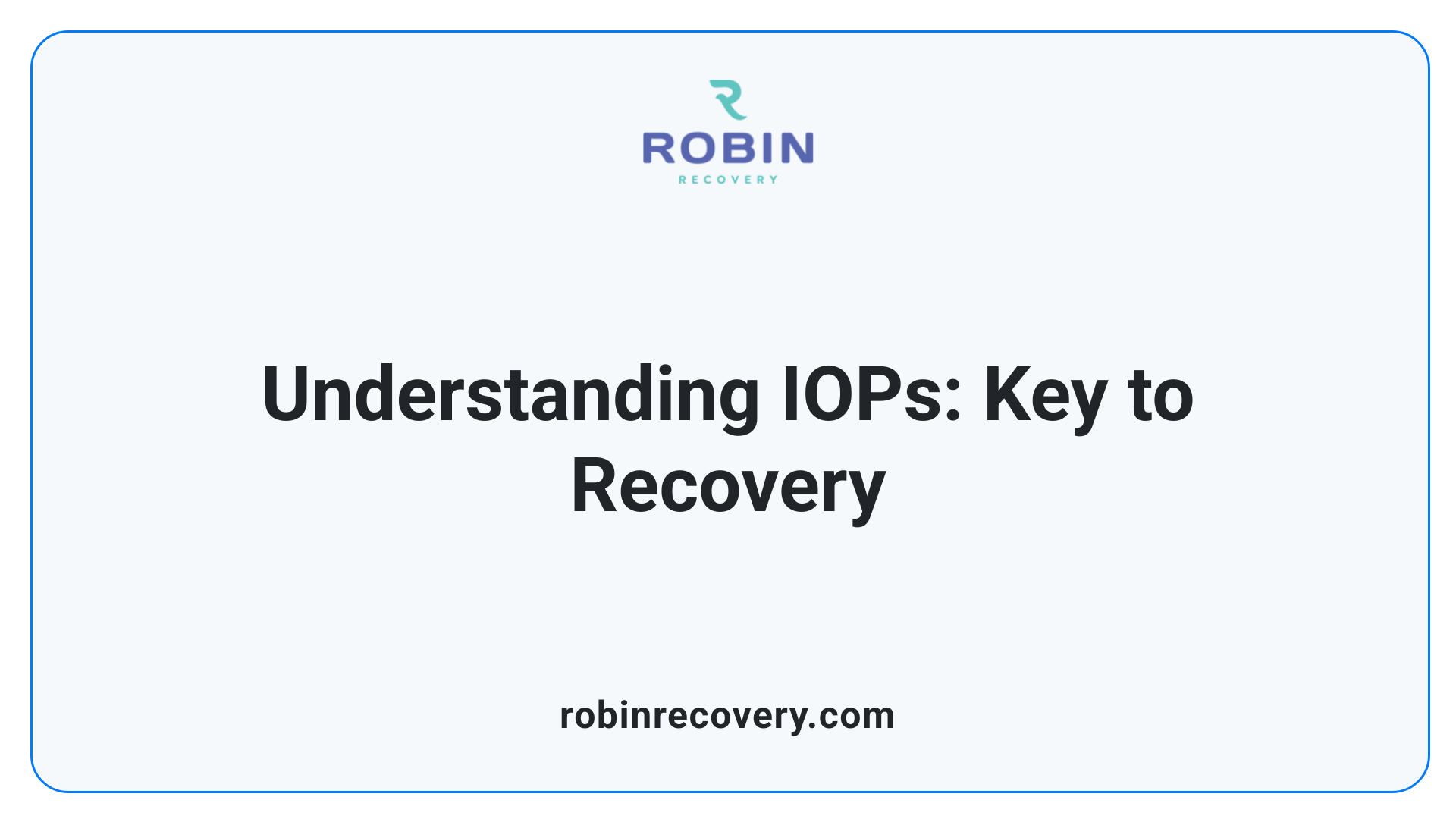
What is an intensive outpatient program (IOP) and what is its purpose?
An Intensive Outpatient Program (IOP) is a structured treatment option designed for individuals dealing with substance use disorders and co-occurring mental health conditions. It typically involves therapy sessions lasting two to three hours a day, three to five days a week, making it more intensive than traditional outpatient therapy. IOPs offer a higher level of support for those at risk of hospitalization or as a transition from inpatient care.
What are the primary components of IOPs?
IOPs encompass several key components that contribute to effective treatment:
- Individual Therapy: Personalized sessions to explore core challenges and develop coping strategies.
- Group Therapy: Facilitates peer support, allowing participants to share experiences and learn from each other.
- Educational Workshops: Teaches about addiction, relapse prevention, and coping mechanisms to enhance understanding.
- Family Involvement: Engages family members in therapy to improve support systems and family dynamics.
- Holistic Approaches: Incorporates methods such as mindfulness and yoga to promote overall mental health.
These elements work together to empower individuals, fostering independence as they apply skills learned in therapy to daily life, thereby aiding their recovery journey.
Structure and Flexibility: An Ideal Framework for Independence
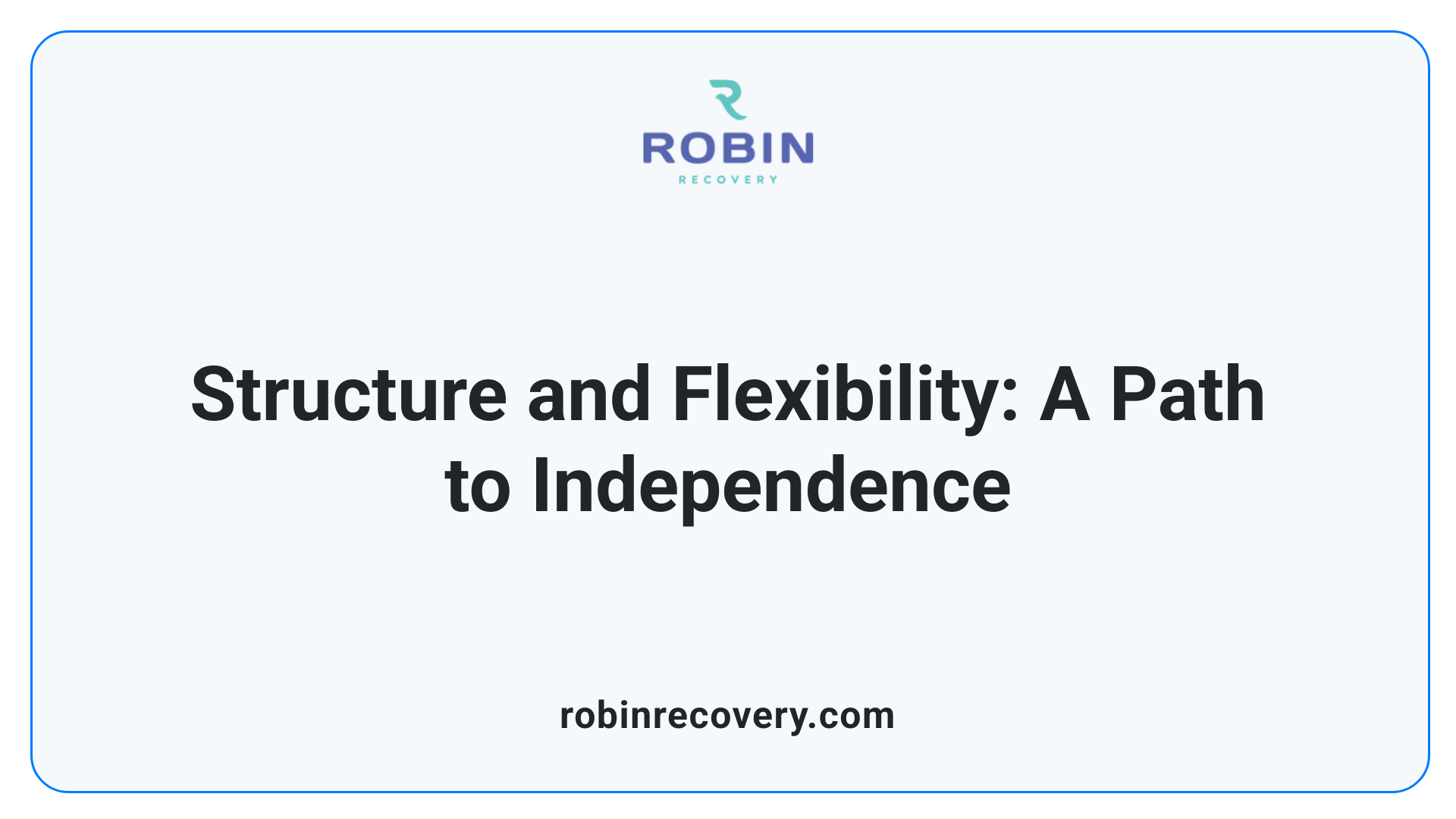
How IOP structures facilitate independence
Intensive Outpatient Programs (IOPs) serve as a bridge for individuals recovering from mental health issues and addiction, offering a structured yet adaptable framework for treatment. Typically, these programs require participants to attend therapy sessions between 9 to 20 hours each week, with sessions lasting 2 to 4 hours. This setup allows clients to engage in a well-rounded mix of individual therapy, group therapy, family sessions, and educational workshops.
By blending these various therapeutic modalities, IOPs cultivate essential skills that promote autonomy and self-management. As clients learn to identify personal triggers and develop coping strategies, they gradually build the confidence required to reintegrate into daily life.
The role of flexibility in IOPs
One of the standout features of IOPs is their inherent flexibility, which is vital for fostering independence. Unlike residential treatments, individuals can attend therapy while continuing their daily routines—such as work or family commitments—thereby minimizing disruption in their lives. This flexibility not only provides emotional comfort but also reinforces the ability to balance recovery with responsibilities.
As participants navigate their treatment, they engage in real-world applications of the skills learned, creating a seamless transition from structured support to self-reliance. The gradual reduction of session frequency based on individual progress further supports this independence, allowing clients to incorporate their coping mechanisms into everyday challenges.
Overall, the structured and adaptable nature of IOPs equips individuals with the necessary tools for achieving long-term recovery and self-sufficiency.
Building Foundations: Essential Skills and Coping Mechanisms
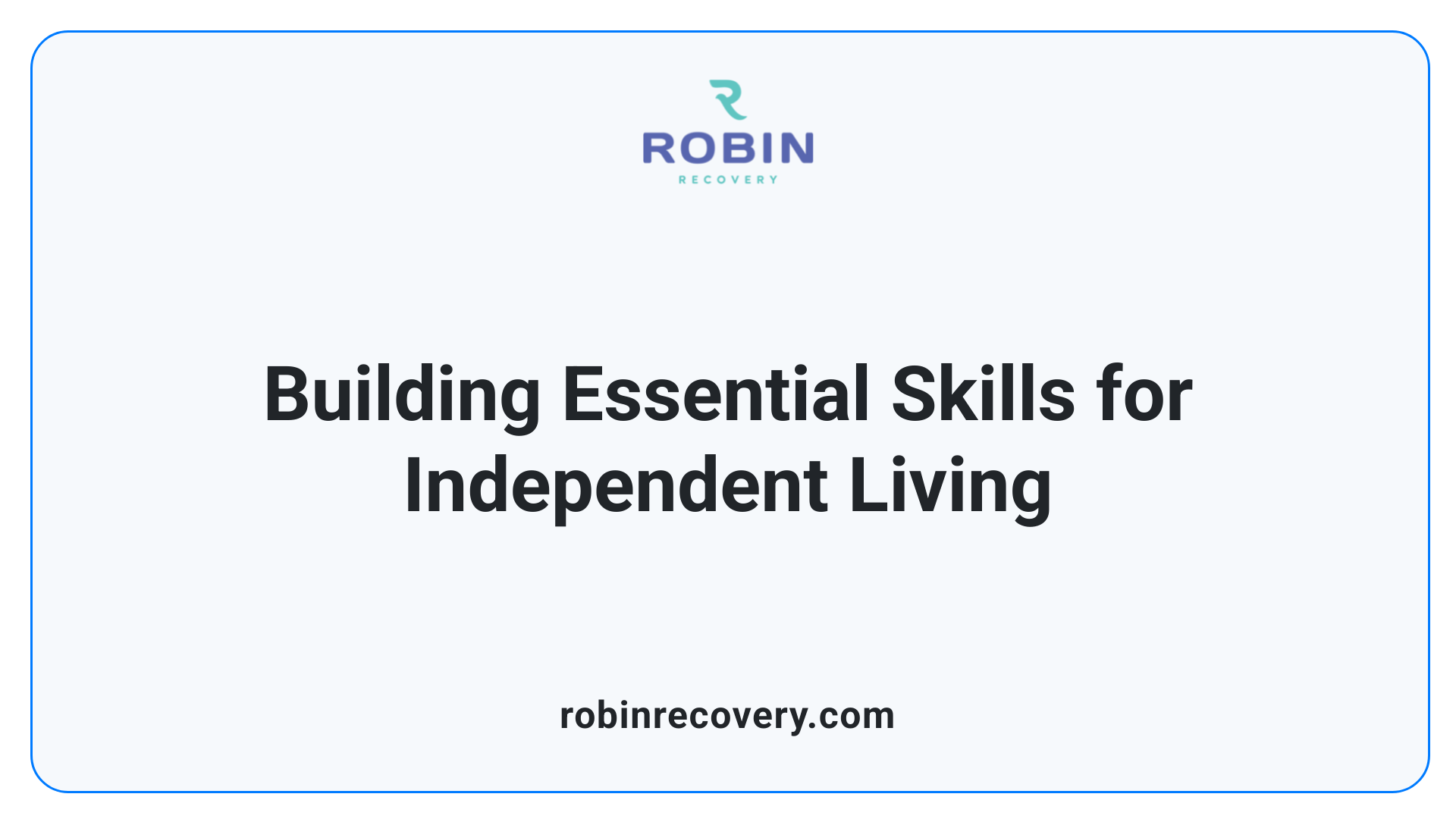
What skills and coping mechanisms are developed in IOPs to support independent living?
Intensive Outpatient Programs (IOPs) equip participants with essential skills and coping mechanisms crucial for independent living. These programs focus on a blend of practical abilities and emotional intelligence, which are vital for navigating life's challenges after treatment.
Skills Developed in IOPs
Participants in IOPs engage in activities that promote daily functioning and self-sufficiency. Key skills learned include:
- Life Skills: IOPs often include training in cooking, budgeting, and home maintenance. This practical knowledge helps individuals manage their households effectively.
- Communication and Relationships: Programs emphasize the importance of communication, empathy, and building healthy relationships, which are pivotal for social inclusion and repairing connections with others.
- Coping Techniques: Participants learn to manage stress and develop strategies that aid in avoiding risky situations, which lowers the chances of relapse.
- Problem-Solving Skills: Improving problem-solving capabilities empowers clients to tackle daily challenges independently.
Coping Mechanisms for Independence
To bolster their emotional resilience, IOPs teach:
- Emotional Regulation Techniques: Learning to identify and manage emotions effectively aids participants in maintaining stability and clarity in decision-making.
- Self-Care Routines: By establishing daily routines, individuals can integrate self-care practices into their schedules, enhancing their overall well-being and reinforcing recovery efforts.
- Social Support Networks: Encouragement to connect with mutual-help groups fosters a sense of community, providing ongoing emotional backing as they transition to independent living.
By focusing on these skills and coping mechanisms, IOPs lay a solid foundation that empowers individuals to live independently and maintain their recovery long after completing the program.
Empowerment Through Community and Personal Autonomy
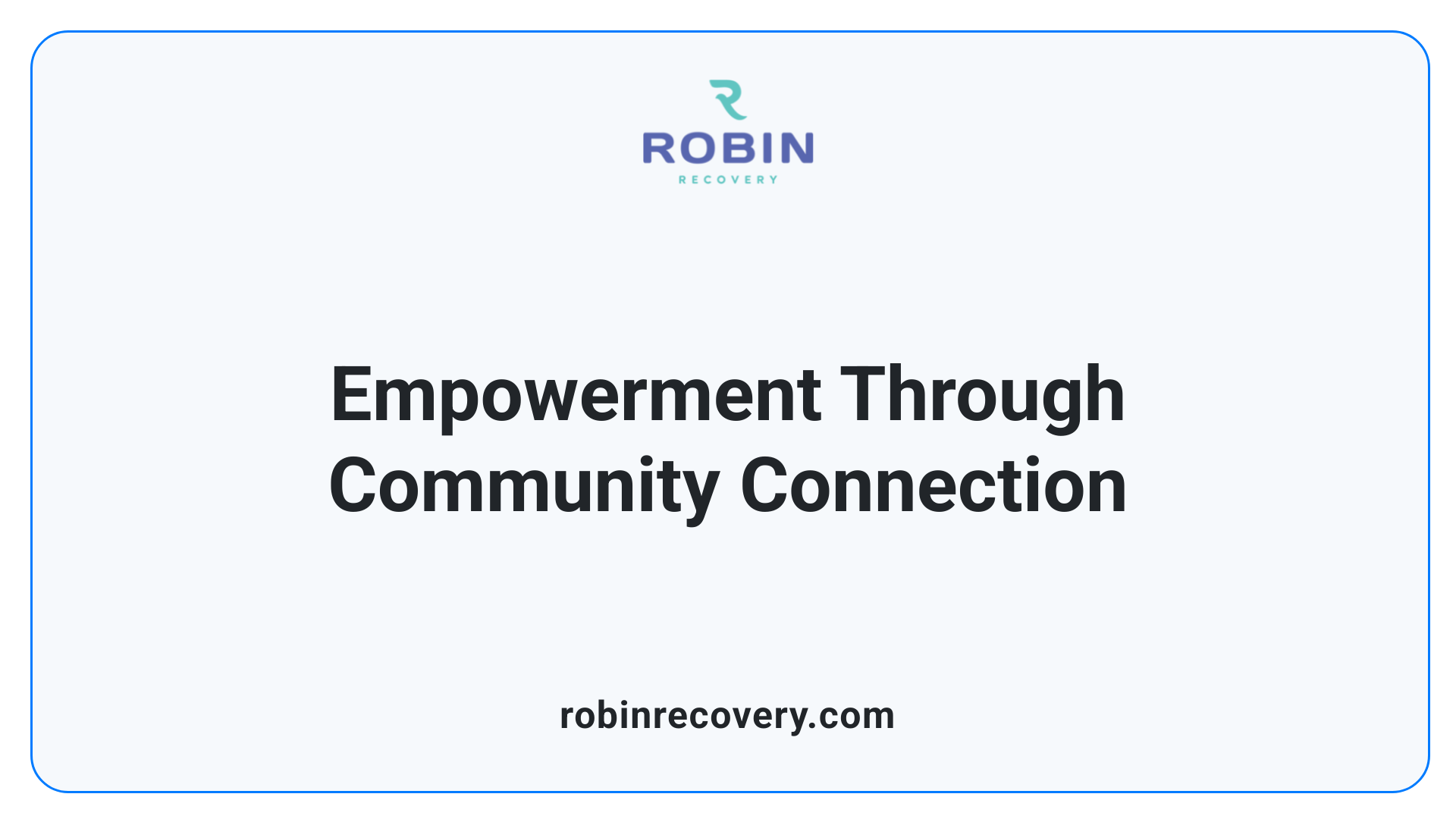
Community Support in IOPs
Community support is a fundamental element of Intensive Outpatient Programs (IOPs). It plays a vital role in recovery by creating a network of connections that individuals can rely on as they navigate their personal journeys toward independence. Participants engage in group therapy sessions where sharing experiences fosters a sense of belonging, which is instrumental in reducing feelings of isolation.
Interaction with peers not only encourages accountability but also inspires motivation. Programs like 12-Step or mutual-help groups further enhance these aspects, encouraging participants to seek out and cultivate supportive relationships outside of formal treatment settings.
How do community support and personal autonomy interact in IOPs?
In IOPs, community support significantly enhances personal autonomy. Individuals are encouraged to make their own decisions and engage actively in their recovery process, bolstering their confidence and self-trust. However, achieving true personal autonomy often involves confronting barriers to community integration, particularly for those with disabilities or in rural areas where support structures may be less robust.
Research indicates that autonomy-supportive environments enable individuals to better exercise decision-making and self-management, positively influencing their well-being. However, the interaction between community support and personal autonomy can vary based on geographic location, with urban areas typically providing more perceived support. Therefore, while community support indeed fosters personal autonomy, structural and environmental factors must also be considered to fully understand this dynamic.
Navigating the Path: The Transition from Inpatient to IOP
Transition process from inpatient care to IOP
The shift from inpatient care to Intensive Outpatient Programs (IOPs) marks a significant transition in a patient’s recovery journey. After receiving intensive treatment in a controlled environment, individuals are gradually introduced to a more flexible setting, allowing them to engage in daily life activities. IOPs serve as a crucial mid-point, maintaining the structure of treatment while encouraging independence.
Patients typically participate in scheduled sessions several days a week, balancing therapy with family and work responsibilities. This dual engagement not only helps in continuing the healing process but also reinforces the skills necessary for self-management in everyday situations.
Role of IOPs in maintaining treatment progress
IOPs play an essential role in sustaining treatment progress achieved during inpatient care. They offer rigorous support through tailored treatment plans that include individual and group therapy, education on coping mechanisms, and life skills development.
One vital aspect is the emphasis on peer support and family involvement, which creates a community atmosphere that fosters accountability. Regular check-ins and therapeutic activities enable individuals to recognize triggers and implement coping strategies effectively. By addressing both psychological and social facets of recovery, IOPs facilitate continuous growth.
How do Intensive Outpatient Programs (IOPs) facilitate self-sufficiency in recovery?
Intensive Outpatient Programs (IOPs) facilitate self-sufficiency in recovery by providing a structured yet flexible treatment model that allows individuals to maintain daily responsibilities while receiving care. By engaging in various therapeutic activities such as individual and group counseling, patients learn essential coping strategies and life skills critical for managing stress and triggers in real-life situations. The supportive community fostered through peer interactions and family involvement motivates individuals, enhancing accountability and emotional support throughout the recovery process.
IOPs often utilize evidence-based therapies, including cognitive-behavioral therapy and motivational interviewing, which empower clients to take ownership of their recovery and develop personal responsibility. Overall, IOPs promote independence and self-efficacy, equipping individuals with the tools necessary for long-term sobriety and self-sufficient living.
Cost-Effectiveness and Accessibility of IOPs
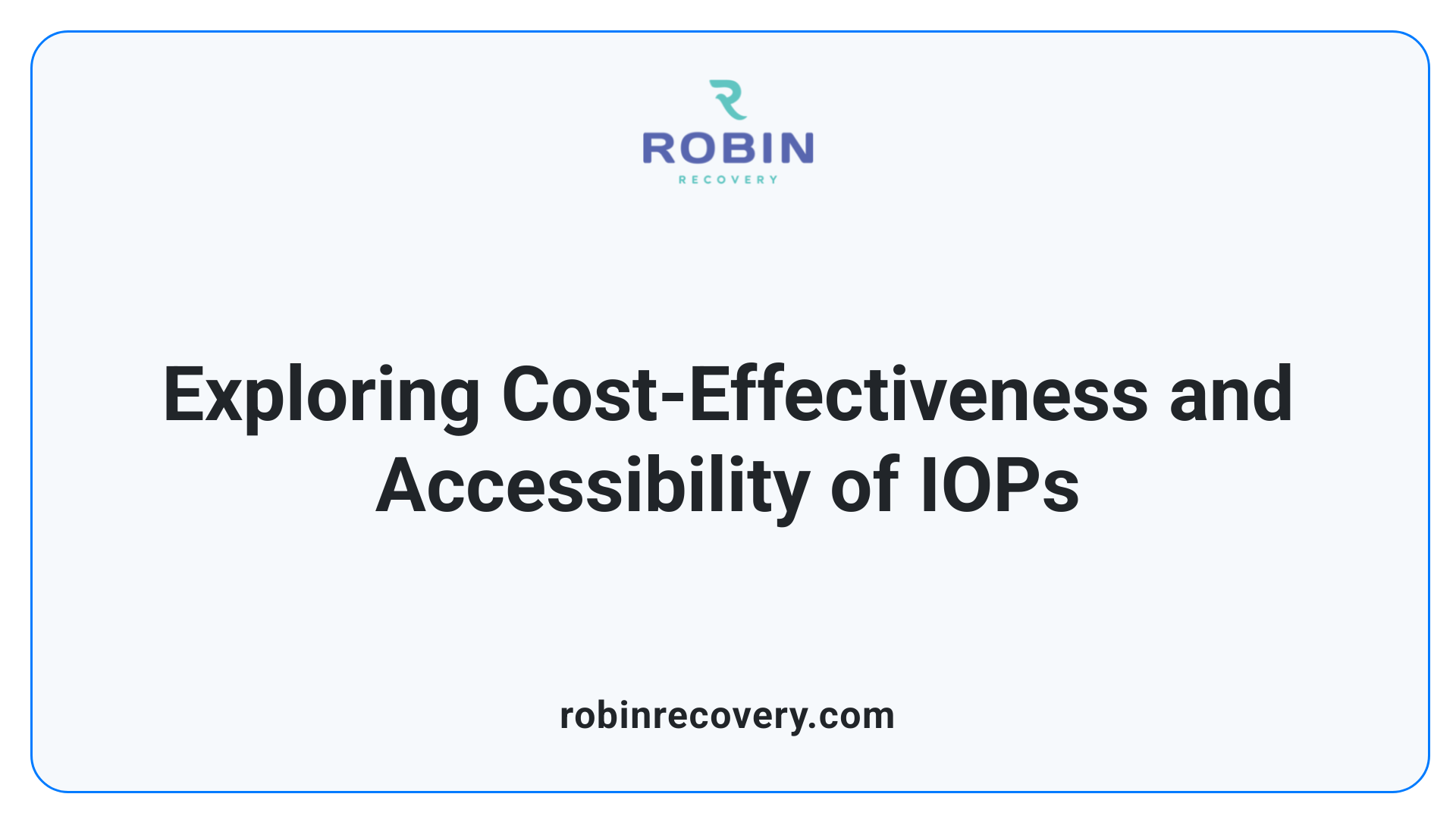
What are the Cost Advantages of IOPs?
Intensive Outpatient Programs (IOPs) are generally a more affordable option compared to traditional inpatient treatment. Since IOPs do not require patients to stay overnight in a facility, accommodation costs are eliminated, significantly decreasing overall expenses. Many insurance plans cover IOP services, enhancing their affordability for a broader range of individuals. This cost-effectiveness makes IOPs a viable option for those seeking comprehensive support without the financial burden that often accompanies residential treatments.
How Accessible are IOP Treatments?
Accessibility is a critical factor for individuals exploring IOPs. The flexible scheduling of sessions, often held in the evenings or on weekends, allows participants to balance therapy with work, school, or family responsibilities. Moreover, IOPs cater to diverse needs by providing a structured treatment environment while enabling continued engagement in daily life. This adaptability fosters independence among participants, as they develop coping and life skills while reinforcing their recovery journey.
Evolving Towards Independence: The Long-Term Impact of IOPs
Long-term Benefits of IOPs
Intensive Outpatient Programs (IOPs) offer significant long-term advantages for individuals recovering from addiction and mental health issues. These programs focus on fostering independence, allowing participants to maintain daily responsibilities while receiving support and therapy. This balance is vital for helping individuals reintegrate effectively into society.
The flexibility inherent in IOPs facilitates the development of essential life skills, enhances coping mechanisms, and prepares individuals for challenges encountered outside of the treatment environment. Skills such as effective communication and conflict resolution are emphasized in group therapy, strengthening relationships and fostering a supportive community.
Independence in Recovery Journey
The transition from structured treatment to independent living can be daunting. IOPs assist in this process by encouraging participants to apply learned skills in real-world settings, promoting self-management of health and emotional well-being. Through regular check-ins and therapeutic sessions, individuals learn to identify triggers, recognize warning signs of relapse, and utilize coping strategies proactively.
Ultimately, the holistic, community-based approach of IOPs not only aids in maintaining sobriety but also instills a greater sense of self-efficacy and autonomy in participants, contributing to their long-term independence.
Conclusion
Ultimately, Intensive Outpatient Programs provide more than just a bridge between inpatient treatment and total independence; they serve as a powerful catalyst in an individual's recovery journey. By focusing on holistic care, skill-building, and community support, IOPs lay a strong foundation for personal autonomy and self-sufficiency. The blend of structure, therapeutic intensity, and flexibility that IOPs offer is instrumental in enabling individuals to reclaim their lives and look toward a brighter, secure future.
References
- Chapter 3. Intensive Outpatient Treatment and the Continuum of Care
- Intensive Outpatient Programs (IOP): Structure, Costs & Benefits
- Adult Intensive Outpatient Program (IOP) - UCLA Health
- The Benefits of Intensive Outpatient (IOP) After Residential Treatment
- What is an Intensive Outpatient Program? - San Diego | API
- How Long Are Intensive Outpatient Programs? - Providence Treatment
- The Benefits of Intensive Outpatient Programs for Substance Use ...
- Different Types of Outpatient Addiction Treatment | A Complete Guide
- 5 Key Advantages of Intensive Outpatient Programs in Addiction ...
- Partial Hospitalization Program vs. Intensive Outpatient Program for ...
